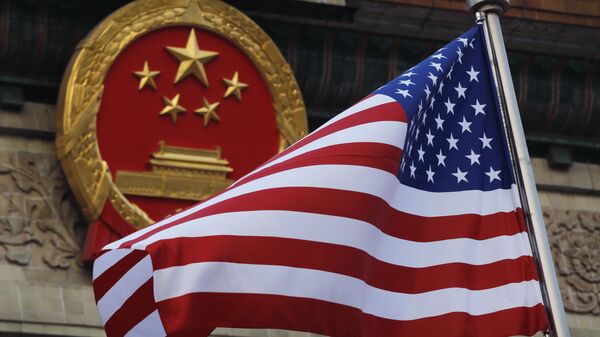With the outbreak of the virus, which has massively affected all countries, especially the West, Deepak Bali, an international relations expert from India, believes that the post COVID-19 world will have “two distinct poles heading towards bipolarity”.
According to Bali, “we are seeing emergence of a new global order where China has announced its arrival", and even though the country will not openly declare it, the increase in its activities attests to the fact that it is there "to challenge the US hegemony”.
At a time when over 68,000 people have lost their lives in the pandemic, several countries and mainstream media outlets have been accusing China of spreading the virus, suppressing facts, silencing whistleblowers, and bullying its citizens as well as the world community.
US President Donald Trump has called COVID-19 a "Chinese virus" and justified the use of the term by saying that the infection originated in the Asian country.
When a reporter during a press briefing mentioned that the virus was being referred to as "Chinese virus", POTUS said that the Chinese “probably would agree”.
“Slanders and blame games cannot make up for lost time. More lies will only waste more time and cost more lives. People's lives should always be valued and placed ahead of politics. It is immoral and inhumane to politicise such a serious public health crisis”, the Chinese Foreign Ministry hit out at the US for engaging the world in its "blame game" last week.
China, in turn, has been providing aid to many of the affected countries: as Europe became the new epicentre of COVID-19, Beijing has upped its outreach with medical aid.
At the same time, not much has come from the US or its NATO allies to combat the virus: Washington has even reasserted that it will not remove the sanctions imposed on Iran, which is battling the crisis without proper equipment.
As the crisis deepens in Europe, the tensions between longtime transatlantic allies and Washington were further exacerbated last week after Germany accused the US of confiscating 200,000 masks ordered from an American producer on 4 April.
"We view this as an act of modern piracy…You cannot act in such a way among transatlantic partners. Such wild west methods can't dominate, even in a time of global crisis", Berlin Senator for the Interior Andreas Geisel said. A similar sentiment was also echoed by French officials last week.
Describing China’s position in the post COVID-19 world order, Bali says “the US has already seen the retrenchment. It is not this crisis that has made the US take a back seat, but it erupted ever since China initiated the Belt and Road Initiative (BRI)" - a campaign to promote development, trade, infrastructure, and economic growth by connecting Asia with Africa and Europe via land and maritime networks along six corridors.
As part of its Belt and Road trade, President Xi Jinping has even pledged to further a “Health Silk Road” along with its mass deployment of medical aid to Europe, African countries, and Central Asia.
Bali says that from this perspective, it was a hegemonic contest that was already in offing, but the coronavirus and post-corona world order will make the two distinct poles head towards bipolarity.
“China has emerged as one of the strongest poles contesting the US hegemony and many people across the world, whether in Europe, Africa, Central Asia, Latin America, South China, so the countries which have interconnected trade and investment with China will continue to look towards China for collaboration, assistance, help, and China is exactly doing the same”, he says.
Apart from bipolarity, the analyst has predicted the emergence of protectionist tendencies in the post-COVID-19 world.
Even though they have already existed, he says, the new world order will see an extreme level of protectionist tendencies, whether it is trade or diplomacy, and the US is not going to make as many efforts in the international arena when it comes to this.
“[European countries and US allies] would gradually withdraw and relocate their investments to some other countries including the revival of industries in their own countries. In the aftermath of this crisis, people would have realised that over-dependence on any country for anything, especially manufacturing, is going to create problems”, the professor concludes.



